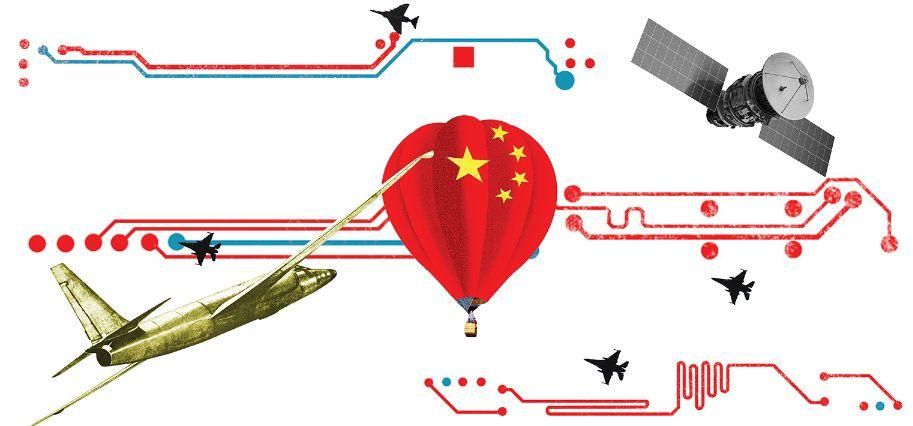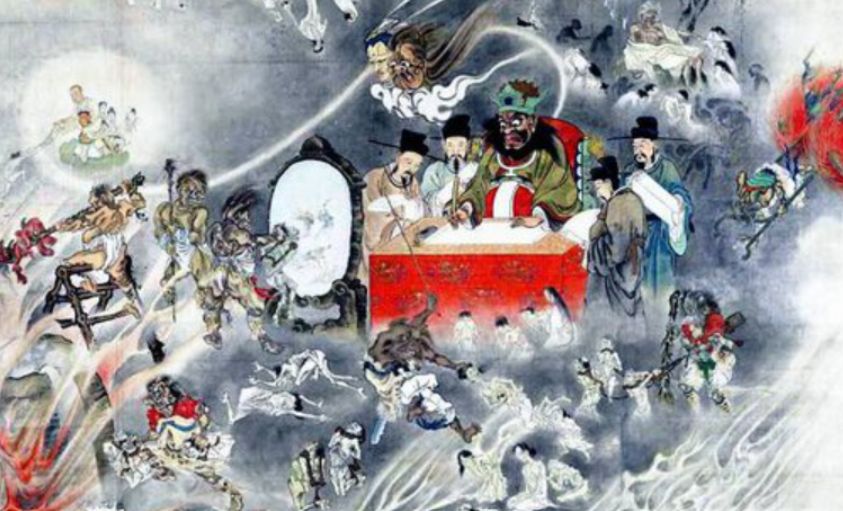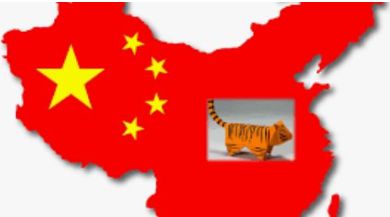By Eric Vandenbroeck
and co-workers
Bad Advice Plaguing Beijing
The incursion in
January of a Chinese spy balloon into U.S. airspace seemed to many observers like
a bad miscalculation by Beijing. U.S. Secretary of State Antony Blinken had
been scheduled to travel to China the following month, but the balloon incident
led to the scrapping of the much-anticipated visit. Chinese leader Xi Jinping
would have preferred to see diplomacy proceed as planned. Likely, he would not
have sanctioned this operation had he known its consequences. He was mistaken
if he believed the United States would overlook the incursion.
Authoritative sources
inside the U.S. government, including senior Pentagon officials, suggest that
the real culprit may have been a bureaucratic error. It is possible, for
instance, that Xi approved the balloon reconnaissance program in
general but did not know the particulars of this specific mission—and could not
identify how it might undermine his immediate diplomatic priorities. This lack
of control seems to belie the conventional image of Xi as a strongman with a
tight grip on his lieutenants. After all, Xi does have a firm hold over the
Chinese Communist Party (CCP). At the 20th National Party Congress last fall,
for example, he appointed to prominent positions an array of party officials
with whom he has close personal ties. But how could such a powerful ruler be
unaware of, or lack quality information about, the potential fallout from a
risky operation?

The fault lies in the
institutional processes that inform decision-making in the Chinese government.
Xi may be a strongman with unchallenged control of the party apparatus. Still,
his decisions in shaping China’s foreign policy are only as good as
the information he receives from his subordinates. Many bureaucrats who advise
Xi and his predecessors are prone to mislead their superiors; others do not
have access to all the information required to assemble a complete picture of a
situation. For those reasons, the very structures that Xi relies on for his
political survival—namely, the rules that make it costly for subordinates to
push back against Xi’s conclusions and that limit coordination between the
military and civilian arms of the state—are the same ones that lead to the
production of bad advice. This habit of flawed decision-making in Beijing makes
costly missteps more likely. If Xi is misled into a more drastic miscalculation
than the spy balloon, it could have dangerous consequences for China and the
world.
Brain, Not Brawn
The conventional
understanding of Chinese policymaking holds that strong leaders can choose
whatever foreign policy suits them, whereas weak leaders must bargain with the
bureaucracy. Under strong rulers such as Mao Zedong, the bureaucracy had little
influence over policy; it only implemented the decisions that came from above.
The picture differed under comparatively weak Chinese leaders, such
as Jiang Zemin, who led the country from 1989 to 2002, and his successor,
Hu Jintao, who was in power from 2002 to 2012. These rulers always feared
resistance or challenges from members of the elite. Under Jiang and Hu,
bureaucrats could leverage their leaders’ sense of vulnerability to advance
their parochial interests by pressuring their bosses to adopt particular
policies.
In this reading of
Chinese governance, famously labeled “fragmented authoritarianism” by the
political scientists Kenneth Lieberthal and Michel Oksenberg, when the party’s supreme leader is weak, the
country's policy often reflects the narrow preferences of the most potent parts
of the bureaucracy. This view also implies an obvious solution to the problem:
a strong person who can put the bureaucracy in its place. If leaders rule
uncontested, bureaucrats lack the political power to advance their particular agendas,
much less resist leaders' important decisions. As such, strong rulers keep
narrow-minded bureaucrats from leading their country into costly
miscalculations.
This view helps
explain the conduct of the Chinese government when it comes to domestic issues,
such as economic planning and environmental regulations. Still, it fails to
characterize decision-making around issues of national security adequately.
Chinese leaders, both strong and weak, have closely guarded the process by
which crucial foreign policy matters are decided. As China’s first foreign
minister, Zhou Enlai, famously noted, “There are no small matters in
diplomacy.” No Chinese leader has chosen a foreign policy to appease the
bureaucracy—nor have the most critical decisions in national security crises
been made by anyone other than the supreme leader.
The traditional
account also needs to explain why influential Chinese leaders have often made
poor foreign policy choices. That is because more than strength alone is
required to guarantee good policy. The information leaders use to make
decisions can be unsound and guide them into costly errors.

The Cloud Of Unknowing
The CCP is a giant
information machine. The bureaucracy exists to collect and process vast data so
leaders can make decisions based on sound analysis. Leaders decide, but the
reports and assessments of bureaucrats shape their choices. In short, the power
of the bureaucracy lies in its ability to shape a leader’s thinking.
If bureaucratic power
is fundamentally about information, then the institutional norms that govern the
quality of the production and distribution of that information are essential.
Ideally, these norms empower and incentivize bureaucrats to provide quality
information. They encourage the appointment of bureaucrats with credentials and
expertise, establish inclusive decision-making bodies that make it easier to
relay reliable information to leaders and give bureaucrats a platform to share
information and deliberate with one another. In reality, however, two types of
institutional pathologies prevent this from happening.
One set of problems
arises when institutional structures encourage bureaucrats to intentionally
distort the truth or discourage them from speaking truth to power. In such
cases, the information that leaders receive reflects what bureaucrats think
leaders want to hear. Bureaucrats do not work hard to discover the world's
actual state; they work hard to figure out what their boss already thinks and
wants to believe.
Such problems have
led to devastating miscalculations. For instance, in the spring of 1969, Mao
ambushed Soviet troops along China’s northeast border. Mao chose the
counterintuitive strategy of “escalate to de-escalate,” aiming to lower
tensions with the Soviet Union. Relations between the two countries had
grown increasingly hostile since the Sino-Soviet split, and Mao began to worry,
based on flimsy intelligence, about an impending Soviet attack. In Mao’s mind,
a show of force would compel Moscow to rein in its details. But his strategy
had the opposite effect. The ambush prompted the Soviets to push back in the
northeast, open a new fighting sector along China’s northwestern border, and
issue nuclear threats. Mao’s miscalculation emerged from an echo chamber. Amid
the Cultural Revolution and its ruthless purges, few bureaucrats were willing
to speak their minds to Mao.
A similar pattern was
evident in China’s decision to invade Vietnam in February 1979 under
the paramount leader Deng Xiaoping—a strong leader at the time of the war. In
theory, the war aimed to “teach a lesson” to Vietnam, punishing the country for
its recent occupation of Cambodia, which Vietnamese officials had done despite
Chinese warnings. The war, however, backfired on China. The Chinese military
fared poorly on the battlefield, convincing Vietnamese leaders they were in a
solid position to repel their neighbor. As one senior Vietnamese official noted
shortly after the fighting, Hanoi had taught Beijing “a lesson.”
China blundered into
the war through poor decision-making. Important institutions—such as the
Central Military Commission, the party’s mechanism for defense planning, and
the Foreign Affairs Leading Small Group, the party’s arm for diplomatic
planning—that the Cultural Revolution had destroyed had yet to be repaired. As
a result, military advisers who accurately forecasted the struggles China would
face on the battlefield were reluctant to speak out against the campaign.
Chinese diplomats provided assessments that they later acknowledged were overly
optimistic. In short, the 1969 and 1979 conflicts illustrate how powerful
Chinese leaders can miscalculate—and that they often do so because of
inaccurate information.
Spy Planes And Hot Dogs
A different set of
problems arises from norms pushing bureaucrats to provide leaders with
information skewed toward a narrow way of seeing the world. Institutional
restrictions on sharing across organizational silos block bureaucrats from
accessing one another’s data. Siloing makes it difficult for generals, for
instance, to see when military actions are unlikely to yield diplomatic
concessions—and for diplomats to see when diplomatic demands exceed the
country’s military capabilities. Worse still, siloing prevents bureaucracies
from policing one another. Diplomats, for instance, cannot question the
military’s recommendations if such information travels strictly up the
stovepipe to the leader. This creates misaligned incentives: bureaucrats are
tempted to provide biased information when they know it will not be
double-checked.
These dynamics led
Chinese leaders to miscalculate during several past national
security crises. For instance, the 2001 EP-3 was concerned when Jiang
chose to detain the crew of a U.S. reconnaissance plane after it collided with
a Chinese fighter jet in the Exclusive Economic Zone (EEZ) next to Hainan
Island. Jiang did not make this drastic decision under duress. He rejected even
more hawkish recommendations, such as placing the crew on trial, likely because
he believed such actions were too reckless.
Instead, Jiang
detained the crew because he thought China could compel the Clinton
administration to apologize for the collision. This hope made sense based on
what his military advisers told him: the crash was caused by a sudden change in
direction by the U.S. aircraft. If Washington were to blame, Jiang believed,
the Americans would apologize. After all, the
United States apologized in 1999 after it accidentally bombed the Chinese
embassy in Belgrade.
But the situation was
different in 2001: China was to blame. Because Washington and Beijing had
different understandings of the actions permissible in the EEZ, the United
States routinely sent reconnaissance missions into this airspace, often
intercepted by the Chinese military. In this episode, the Chinese pilot
involved in the collision was hot-dogging the U.S. aircraft by undertaking
risky aerial maneuvers. As a result, the United States stood firm. Although it
made some half-hearted gestures expressing regret about the situation, it
refused to capitulate to Beijing’s demands for an apology.
What is remarkable
about the 2001 EP-3 crisis is how little support Jiang had in figuring out that
the military had misled him. Available accounts suggest that the foreign
ministry and civilian intelligence agencies did little to push back on the
information the Chinese military provided early in the crisis. China’s
institutions were deeply separated between military and civilian silos, which
made it hard for diplomats and intelligence officials to correct what the
military told the leader.
Strong and weak
Chinese leaders face the challenge of determining whether the information they
receive is accurate. Everyone has his lie-detecting methods. But bureaucrats
who are either unwilling to deliver or incapable of providing precise
information offer their superiors little support. Leaders must make decisions
without the benefit of bureaucracies committed to refining and correcting one
another’s work.
Xi’s Institutional Dilemma
Bureaucracies in all
countries can commit these sins of commission and omission. But some tend to do
so more than others. Many countries design institutions in ways that ensure
that bureaucrats feel secure enough to speak truthfully. They establish
mechanisms that make it easier for bureaucrats to share information, making it
harder for them to lie to their bosses. Officials expect to face criticism and
debate if their analysis is half-baked. But the system works only if
bureaucrats feel safe from retribution for their assessments and if the
system's internal workings are transparent enough to give officials a sense of
what their counterparts in other agencies are thinking. If siloed away from
each other, bureaucrats cannot have productive arguments that generate better
policy.
Xi's dilemma—and the
one all leaders in the People’s Republic of China have faced—is that the same
processes that deliver inaccurate information also tend to help leaders subdue
would-be political challengers. Appointing loyalists to vital bureaucratic
posts and restricting information sharing among bureaucratic organizations
ensure the bureaucracy does not grow too powerful. Enfeebled bureaucrats might
not offer good information, but they are unlikely to support or lead a
political challenge against the leader. Restricting information sharing and
deliberation may produce poor advice in the long run, but it also ensures that
the bureaucracy cannot oppose the leader in the short run.
This dilemma is more
acute in foreign policy because the Chinese national security bureaucracy plays
a vital role in a supreme leader’s political survival. In authoritarian regimes
like China, leaders survive when they can dissuade and put down political
challenges from elites and society more broadly. Leaders give themselves the
best chance of perseverance when they firmly control the coercive arm of the
state, such as the defense and intelligence bureaucracies. As Mao famously
noted, political power grows out of the barrel of a gun.
The unfortunate
reality is that bad institutional design can make for good politics. Chinese
leaders politically profit from ensuring that the national security bureaucracy
is firmly under the leader’s thumb. The structures that provided poor
intelligence during China’s conflicts with the Soviet Union and Vietnam were
part and parcel of a political strategy Mao pursued during the Cultural
Revolution to guarantee that the bureaucracy could not challenge his chosen
successor or deviate from his revolutionary path after his death. The delivery
of incomplete information during the EP-3 crisis resulted from the political
design intended to limit interaction between the Chinese military and other
civilian organs of the state.

On The Verge Of Error
The implications of
China’s institutional pathologies are profound. A future conflict between the
United States and China is not inevitable. But a war could ensue if one or both
sides miscalculate the costs and benefits of fighting. The same type of
inaccurate reporting that, according to many news outlets, occurred in China
during the early weeks of the COVID-19 pandemic could spill over into
national security decision-making. Xi’s senior defense and diplomatic advisers
might feel it is politically impermissible to tell him the truth and end up claiming
that China is more vital than they believe it to be. China could then charge
headfirst into an invasion of Taiwan based on false optimism.
The good news is that
Xi’s actions do not yet mirror the mistakes that produced China’s worst foreign
policy miscalculations during the 1960s and 1970s when it was impossible or
highly costly for senior advisers to speak candidly. In Xi’s China, this would
require significant developments, including the suspension of key bodies
such as the Foreign Affairs Commission, the removal of senior diplomatic
and defense officials from these bodies, or the shifting of Xi’s
decision-making into different forums in which senior diplomatic and
security elites are not permitted.
The bad news is that
Xi seems to have done little to address the siloing of the state’s civilian and
military wings—the same siloing that produced China’s 2001 crisis with the
United States. On the contrary, Xi has strengthened the power of the Central
Military Commission and continued to exert unilateral control over the party’s
military bureaucracy. This places tremendous pressure on Xi to put all the
pieces together himself. And this imperative might help explain the balloon
blunder: Xi may have approved a general policy for balloon reconnaissance, perhaps
years ago, with limited debate about how such a policy could backfire in the
future. The possibility of such miscalculations in the coming years should
cause concern for U.S. policymakers. The Chinese military may tell Xi it is
ready for war, and a catastrophe could ensue if the rest of the bureaucracy is
institutionally prevented from checking the military’s math.
For updates click hompage here